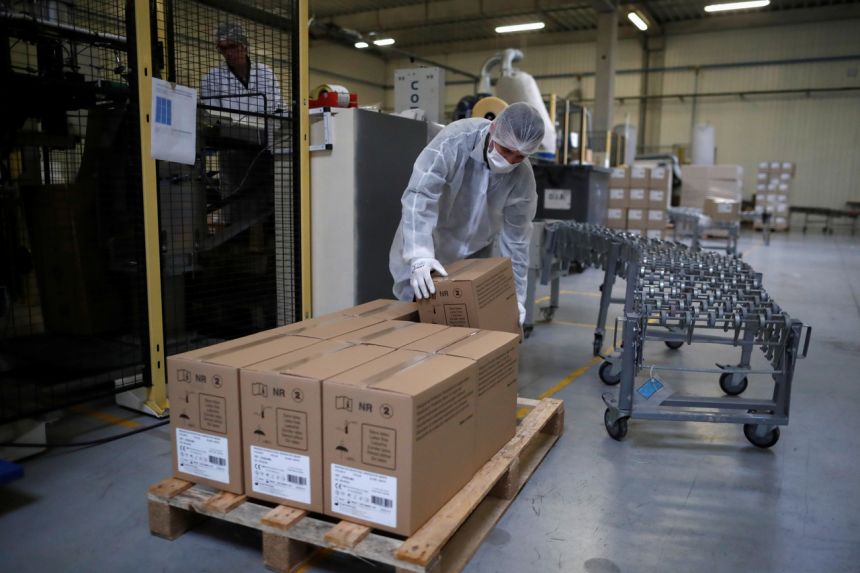As coronavirus spreads, face mask makers go into overdrive
Sign up now: Get ST's newsletters delivered to your inbox
ANGERS, FRANCE (NYTIMES) - The relentless whir of machines echoing across a cavernous French factory floor this week is an unexpected result of the deadly virus that has nearly paralysed cities in China and other parts of Asia.
The company, Kolmi Hopen, happens to make an item that is suddenly one of the world's hottest commodities: the medical face mask.
The factory, in Angers, typically makes around 170 million masks a year, but in the last week, orders arrived for a staggering half-billion, flooding the sales department's inboxes at the rate of one every two minutes. Kolmi Hopen is racing to hire more workers to keep the machines running 24 hours a day, seven days a week.
"We're making masks as fast as we can," said Mr Guillaume Laverdure, chief operating officer of Kolmi Hopen's parent company, Canada-based Medicom, as forklift drivers moved boxes of freshly finished masks into trucks.
"But demand is still rising," he added.
The coronavirus outbreak has set off a run on protective masks across China and in major cities.
To curb the spread of the virus, the Chinese government has ordered citizens to don masks every time they go outside. Medical professionals said once used, a mask must be replaced with a fresh one, driving an explosion in demand.
Grim scenes of people lined up for hours to get a protective face covering, only to be turned away when pharmacies run out, have become familiar.
"I can't find a single mask to buy," said Ms Sandy Lo, 60, in Hong Kong. "I don't know what stores have stock anymore." She said she reuses old masks, "because what else could I do?"
Most of the world's face masks are made in China and Taiwan. But factories there, including ones run by Medicom, have been forced to temporarily halt exports to comply with government demands to reserve them for frantic residents.
On Monday, the Chinese government, conceding it was in urgent need of medical masks and other protective gear, said it would begin importing them from Europe, Japan and the United States to help make up for the shortfall.
It has made the Kolmi Hopen outpost in western France an unlikely hot spot. Phones at the factory have been ringing off the hook as medical supply buyers scour the globe for mask-makers.
Demand is especially strong for high-filtration respiratory masks, which can be more effective against the spread of virus-laden droplets than surgical masks, Mr Laverdure said.
Another Medicom factory that makes face masks, in Augusta, Georgia, is also ramping up production. Mr Laverdure declined to discuss financial details, including the cost of the masks.
Scientists said there isn't much evidence that masks actually protect healthy people - hand washing may be more important.
Still, as the coronavirus spreads, with thousands of confirmed cases and hundreds of deaths, experts fear that supplies of face masks and other sanitary protection items will run low in other countries - even for routine medical use. Pharmacies in the US have begun reporting shortages.

The frenzy of orders at Kolmi Hopen shows the large-scale disruption that China can create in the global supply chain for even the most specialised products, if factories there fail to operate at full strength.
China alone produces about half the world's sanitary face masks - around 20 million a day, or more than seven billion a year, supplying hospitals and medical workers in numerous countries. Taiwan makes up another 20 per cent of the global supply.
Production had already slowed, as Chinese factories wound down for the Chinese New Year holiday in early January. Some sites around Wuhan, the epicentre of the coronavirus outbreak, have yet to fully revive production and are operating at around 60 per cent capacity, according to the government.
Medicom's factory in Wuhan, which makes surgical gowns, is among those that have delayed reopening. The company's mask-making site in Taiwan is no longer allowed to export. And at Medicom's Shanghai factory, the government sent in monitors and is requisitioning the three million masks produced daily as they roll off the production line, Mr Laverdure said.
Supply shortages could be made worse by the fact that parts for masks and respirators are made in a variety of countries.
More than 90 per cent of surgical masks sold in the US are produced overseas, according to the Department of Health and Human Services. Parts - or sometimes the final assembly - may be based not only in China and Taiwan but also in Japan, Vietnam, Mexico and Colombia.
"These countries could easily cut off our supply chain," said Mr Laurie Garrett, a policy expert and Pulitzer Prize-winning reporter who has written about the Sars, Ebola and other outbreaks.
With China's pipeline to the outside world running dry, medical suppliers around the globe, including giants like Honeywell and 3M, are scrambling to find alternative sources. Both companies said through representatives that they were experiencing a surge in demand and were moving to ramp up production wherever they could.
At Medicom, officials this week rolled out an emergency plan this week for the Angers factory to add 30 new workers to the 100-person operation, with an eye to moving towards round-the-clock production. The company is pumping out more than a million masks a day - twice the normal amount, Mr Laverdure said.


